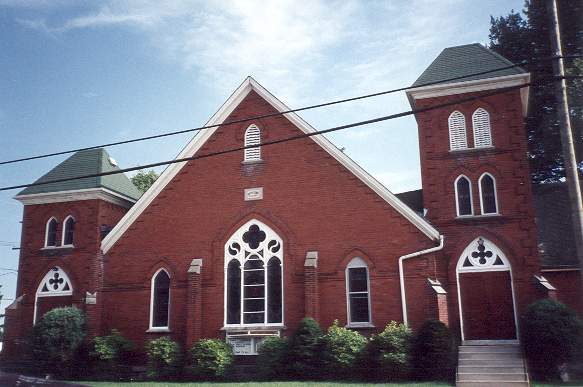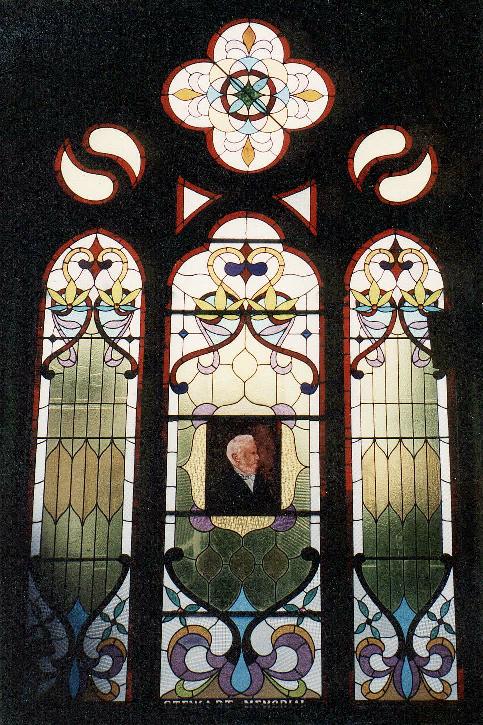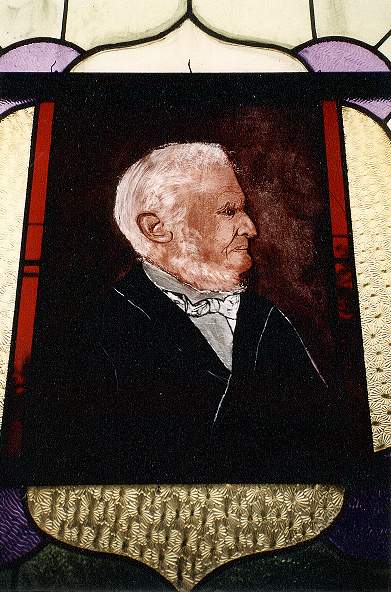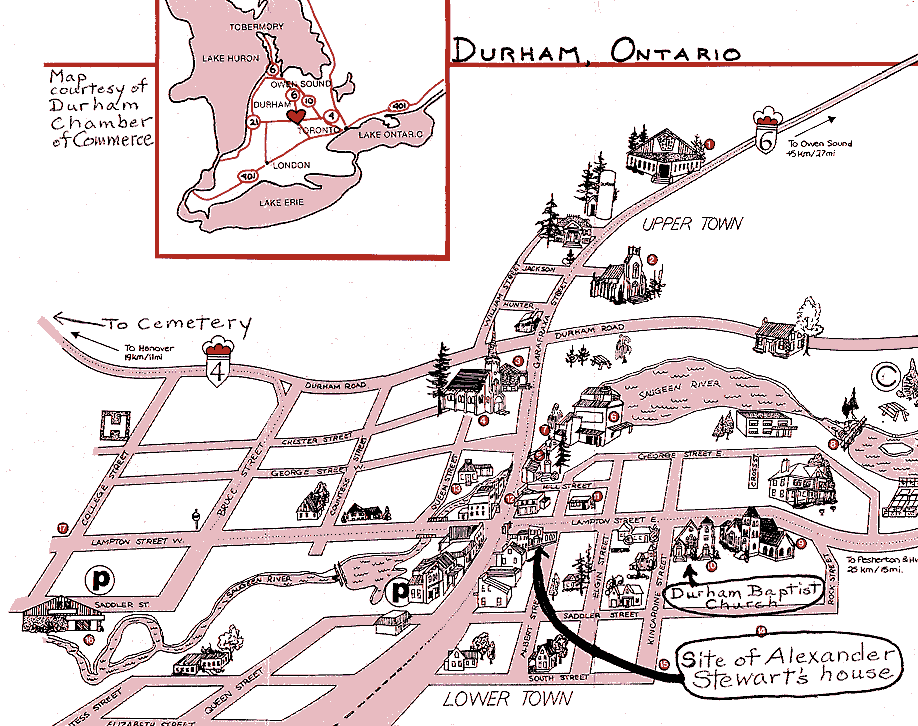The Durham Chronicle,
Centennial Edition, wrote on August 3, 1972:
When Durham Baptist Church holds its special Centennial service on Sunday August 6th
the service will have a direct link with Durham's earliest days as a settlement.
When the first settlers were trekking into Durham, among them was a pioneer Baptist
minister, the Rev. Alexander Stewart, who according to early records was here prior to
1848. The house which he built still stands [but was demolished soon afterwards] on the
knoll of Lambton St. just east of the Royal Bank.
Although it is recorded that the Rev. Alexander Stewart came to Durham as a colporteur,
it was he who founded the Baptist Church here, which was one of the first organised
congregations in the area. A stained glass window in the present building contains a
picture of the founder of the Durham Church.
On Sunday August 6th Rev. Hugh W. Stewart will be the speaker at the Baptist Centennial
service. He is the grandson of Durham's first Baptist minister and church founder, Rev.
Alexander Stewart.
When the Reverend Alexander Stewart moved to Durham he was the first ordained minister
in the area. He organized a Baptist congregation in his own home and helped build a frame
church building for it in 1858-59. By 1861 there were four churches in the village but
Rev. Stewart continued to be so beloved by his neighbors that they called him "Father
Stewart". It had been a Scottish custom to ask a favorite minister, not necessarily
the parish minister, to perform one's marriage and "Father Stewart" was often
called on even by people not in his congregation.
Durham, with a current population of something over 2500, is still the center for the
surrounding countryside of rolling, small hills. The hollows between once were cedar
swamps. Only scattered clumps of cedars now remain to remind us of the forest that once
covered the area, replaced by prosperous-looking farms with dairy and beef cattle, brick
and stone Victorian and early 20th century farmhouses. Douglas Dadson, a great-grandson of
Alexander Stewart, wrote: "Durham still has the character of a prosperous mid-19th
century western Ontario town -- evident in the 'neighborly' people I met and in the many
solid brick and stone houses."
The Stewarts' house stood on Lambton Street in the part of Durham that was formerly
part of the town of Glenelg. It was on a rise on the southeast corner of Lambton and
Garafraxa Street, now the business center of Durham. It stood until the 1970s when it was
torn down for a parking lot between the commercial building on Garafraxa and a law office
on Lambton. A newspaper photograph shows the house in the 20th century as a 1½-storey
structure with a door and window in the gable end at ground floor level and two windows
above under the roof, which slopes down on the left to cover a shed addition. It was sided
with stucco or "rough-cast". John MacArthur, one of the Durham Baptist Church's
oldest members, explained in 1990 that houses were often roughcast because the area had
lots of limestone. Farmers cleared their fields of stones and then took advantage of them
by burning them in kilns and selling the lime for use in mortar and stucco.
AMS described this period of his grandfather's life:
In June of 1900, this writer sat beside Reverend Alex Stewart in his garden in Durham,
Ontario. It was then that the grandfather told the grandson that about fifty years before
he had come and sat in the same spot in a huge forest and wondered whether he should bring
his family to this proposed settlement now called Durham, Ontario. It was two or three
years later before he was ready to move. Delay doubtless was caused by the birth of his
son, Joseph William Alexander Stewart, on January 17th, 1852. Imagine a pioneer family
with some young daughters, and a mother carrying a small baby boy, moving into the
wilderness. At the time of moving to Durham, the Guelph-Owen Sound Highway was only an
Indian trail, widened into a rough cadge road. ...
Despite the fact that the Red Sandy Stewart had had less than five months of schooling
in Scotland, for which he had to walk nine miles each way, he nevertheless developed
qualities of leadership, persuasion and public speaking. Exercising these with the help
and blessing of his good wife, he became a Baptist missionary preacher for the raw new
country in the counties of Grey and Bruce and was ordained. He founded the Baptist Church
in Durham and was the first minister or clergyman of that. village. ... His salary, paid
by interested Baptists in Toronto, was $200.00 a year. His good wife supplemented this
meager allowance by taking in boarders, one of whom began the education of [her son] by
teaching him "his spellings'. [Until that son] was earning money for himself, he
always was clothed in second-hand clothes. These clothes were cast-off, and sent up by
religious people in Toronto. There are [writing in 1947] remains, however, of almost
century-old quilts and shawls, made from native wool, and spun by the good wife.
Son JWAS told a little more about how the dedicated missionary's family managed to
survive:
How did he and his family live those early years? Two summers my father went to older
parts of the province and worked in the harvest fields. One year his entire income from
Convention and field was one hundred and thirty-seven dollars and fifty cents. He chopped
and drew his own wood. He got all out of his little bit of ground that it could be made to
yield. While he labored on my mother opened the home to boarders, sold milk, vegetables,
and I know not what. The edge of actual want was reached more than once. The family could
not possibly have been clothed had it not been for the kindness of Christian friends in
Toronto and elsewhere whose kindness my father can never forget. I see distinctly before
me now the first coat that was actually bought for me out of a store! Perhaps I might have
had that coat sooner were it not that in 1858-9 when the little chapel in Durham was
built, my father besides his manual help, paid on that chapel out of his own pocket and
out of his poverty ninety-six dollars and twenty cents. How he did this I cannot tell, but
I found the bill of it lately in rummaging his papers.
Isabella Cranston McGibb, writing in The Canadian Baptist in 1932, summarized Alexander
Stewart's ministry and added:
Mr. Stewart was a true pioneer. He knew what it meant to see the last of the flour in
the barrel made into bread for his family and have no idea where the next was coming from.
He shared the plainest fare of the pioneers. His lunch of bread and cheese carried on his
journey was cheerfully shared with those who had less. He hadn't a multitude of material
possessions to share with his people, but he had abundance of good cheer, kind
words and a message of salvation, which he gave liberally.
In those early days a receiver of a letter had to pay the postage, which amounted to
122 cents. The Rev. Mr. Stewart heard there were three letters in the post office for him
and he had no money. But faith did not waver. He went to the postmaster and told him the
situation and some arrangement was made and the letters were handed to him. In two of them
there was money from friends. How true is the promise, "Before they call, I will
answer."
The agricultural part of the census of 1861 gives a few details about how the family
lived. They had an acre of land (probably planted mostly in potatoes, since they give the
most calories per square yard of land, as well as such vegetables as cabbage and kale),
and they kept cow and a few pigs for milk and pork. The acre certainly could not have fed
the cow, so probably the children took her out into the countryside to browse and graze
each day. Perhaps they were able to collect and store enough grass and leaves to keep her
alive over the winter, or perhaps Esther saved some of her pennies to buy hay.
By 1861 Alexander Stewart had been able to acquire a horse again to take him on his
rounds. The horse, cow, and three pigs were valued at a total of only $100 and the
"capital invested in real and personal estate" was listed at $900, including the
house and the acre of land in the center of the thriving village. Esther and the children
must have worked as hard as their dedicated and hard-working missionary husband and
father.
In his work as a home missionary sent out by the Canadian Baptist Church, the Rev. Mr.
Stewart was covering hundreds, even thousands, of miles a year on foot and on horseback,
preaching two or three sermons a week, and making more than seven pastoral visits a week.
This would be a busy schedule for a minister even today, with a car and paved roads. On
the 19th century frontier, it was heroic.
A letter from him, published in The Christian Messenger of 20 December 1855, gives
something of the flavor of the early years of his ministry:
Dear Brother,
You will no doubt be anxious to hear how the cause prospers in this part of the Lord's
vineyard. A church meeting was held in my house on the 29th of Sep. when the brethren with
one exception requested me continue my labours among them. At the same meeting it was
agreed, that the brethren on the Durham Line East, should have the Lord's Supper
administered in their own settlement, and that the brethren in Egremont would have the
same privilege. This arrangement will divide the church at Durham in four branches, each
branch having the privilege of communion in a regular manner. I went to administer the
Lord's supper in due course, at the house of Donald McKenzie, on the Durham Line on the
second Sabbath in October and found that he had departed to his rest and was no more to be
seen here. He died of a short sickness, but in the enjoyment of a good hope in Christ. He
was one of the first persons baptized, in one of the Western Isles of Scotland, and lived
to the age of 78 years, always maintaining an unblemished character. I attended his
funeral and endeavoured to improve the solemn event for the good of those who were left
behind in the wilderness. After preaching I baptized three persons, in the name of the
Triune God.; two of whom are heads of families. A universal manifestation
of brotherly love prevailed through the whole of the day, and it was to me, one of the
happiest Sabbaths I have ever enjoyed since I came to these parts.
On the following Friday I met with a very extraordinary occurrence. Returning to my
house some time after dark, I found a woman who I had never seen before, who soon made
herself known to me. She had embraced a hope in the Saviour, about six months ago, and at
that time had a strong desire to follow her Lord and Master, in the ordinance of Baptism,
feeling that she could not enjoy peace of mind until she had obeyed her Lord's command.
There was noone in the township where she resided, to whom she could apply to obtain the
privilege, and she had come all the way from Saugeen with the husband's consent to Durham,
a distance of 45 miles leaving two small children in her husband's care, to seek an
opportunity to obey the command of Baptism. I had to preach in Bentinck on the Sunday
following, and asked her to stay over that day, and then she might meet with the brethren;
and if they received her as a believer in Christ, I would baptize her according to her
wish. She made her way to the place on Saturday, was received, and in the presence of a
very respectable assembly I baptized her and she returned home to her husband and dear
babies with a heart full of joy and peace. Before enjoying the delights of descending into
the baptismal stream she had travelled 51 miles, over very rough roads in a new country.
Her name is Ann McArthur and her native country is Scotland.
I can say to you, my dear Bro. in Christ, that I have been in the school of experience
since I came to this part of the country. I have left my home to fill my appointments when
my house was without a loaf of bread, and not a York shilling to purchase one. But I did
not leave my family to provoke providence. I trusted in the Lord and the God of the Bible
to supply our wants. Often when I have returned home weary and exhausted, I have found two
or three letters pressing me to visit the places they came from, to preach to dying
sinners "the word of life". When will the time come to favour Zion, by raising
up a host of goodly ministers, to stand upon her walls to sound the trumpet of the blessed
gospel of peace.
I am sorry to hear that MacIay College is not likely to go into operation soon. One of
the first questions our churches ask when they want a minister is -- is he an educated
man? If he is a self-taught man they say he will not suit us, but he will do for the back
settlements. What is the result if he is sent there? I can tell you from experience that
it will be to meet a more intelligent congregation of people, than can be found in many of
the old settled parts of the country. I am not able to hold the ground that is gained
without more help. We must leave all in the hands of God. The residue of the Spirit is
with him, and he knows the needy state of this part of the country.
ALEXANDER STUART [sic]
That same year, The Canadian Baptist had reported on a tour of a deputation that
visited the frontier, going by stage from London to Goderich on Lake Huron, then by water
or horseback to Kincardine, where they met Alexander Stewart. A member of the deputation
wrote:
I again take up pen to complete the account of our visit through the new regions in the
North. ... Next morning we left for Durham, a distance of nearly 45 miles. Rev. Wilson was
furnished with a good horse and I came in for a due share of Mr. Stewart's. This portion
of our journey was performed by alternate riding and walking. ... We
spent a short time with a few Baptist friends in Greenock, a place which Bro. Stewart
occasionally visits, and where the field is fully open for labour. ...
The village of Durham contains between 3 and 4000 inhabitants and will rapidly
increase. Bro. Stewart is pleasantly situated here and through his indefatigable exertions
has collected together a church numbering over 50 members. ... The church in Durham are
desirous, and ought to be supplied, with preaching every Sabbath, which Bro. Stewart is
not able to do, and occupy the other important stations which he now visits and which are
continually growing in interest. ...
We reached the first small church in the town of Arthur...They also requested Bro.
Stewart to give a brief account of their organisation, with their doctrinal sentiments and
their practice since they became a church, which he did. He then read over the articles of
faith and practice contained in the Minutes of the Grand River Association to which the
church unanimously agreed. ...
We were favourably impressed with the work which is being done through our Missionary
Society in this new region of the country ... Among the Scotch portion of the inhabitants
we found many who were friendly to Baptist sentiments.
I am grateful to Helen Poole for transcribing and sending the previous two letters, one
by Alexander Stewart and the other concerning his work.
One of the churches established with the help of the Rev. Alexander Stewart was the
Baptist Church of the Hanover and Carrick area. In 1960 the pastor, the Rev. Alfred J.
Barker, wrote a history of the church on the occasion of the 100th anniversary of the
first baptism of that congregation. Excerpts follow:
[A] people who have a sense of history will face the tasks of the present and the
future with dignity. The appreciation of what has gone on in the past helps us to face the
present and future with courage and a sense of proportion. It is also important to think
of the past of our Church's life, for it also takes us back to the beginning of community
life in Hanover. ...
The first Baptist missionary in the area was the Rev. Alexander Stewart, familiarly
known as Father Stewart. He was that indeed to many Baptist causes, as well as being the
sire and grandsire of noted Baptist ministers, educators, and laymen of distinction. He
himself came to Canada in 1832, was ordained into the ministry in 1851, and in 1853 began
missionary work in Durham, where he organized a church. His ministry was exceedingly
fruitful down the years. ... His success seems to have been due not to any spectacular
means, but to an earnestness born of deep faith, and expressed in loving, patient service.
It was a common occurrence for him to walk the sixteen miles to Mount Forest in time for
an eleven o'clock service. So he travelled on foot over the primitive roads to preach to
the little band in Hanover.
Apparently in the mid 1850s a little group of English-speaking Baptists had settled in
the new village, which in 1856 came to be known as Hanover. ... In coming to gather these
together to meet from time to time in homes, the first foundation stone was laid. The
second stone was laid in the establishment of a work among the German-speaking settlers by
the Rev. John Stumpf. ...
On August 24, 1859, a little group of Baptists banded themselves
together and formed the Carrick Baptist Church. ... The real beginning of organized work
in Hanover seems to have begun with the completion of the first little wooden church,
which still stands on Twelfth Street. Both English and German speaking groups met in the
building at different times for their services...and the first gathering in 1861 of the
Huron Association met here, after its founding the previous year.
At first the English-speaking congregation founded by Rev. A. Stewart flourished, and
the little chapel became rather small for the numbers that attended. Mr. Stewart tells in
one report that his flock was "for intellect and stability of more than common moral
worth".
Rev. Barker went on to say that Alexander Stewart remained the pastor through 1862,
that after him "they were without a settled pastor more than they were with
one", the English-speaking congregation dwindled and the German-speaking one
flourished; finally, the congregation once again became English-speaking. The little
wooden chapel was replaced by a larger church and it, in turn, by one still larger. The
program to celebrate the church's centennial in 1960 was addressed by the grandson of
"the founding minister", Rev. Hugh Stewart.
In another article, Rev. Barker wrote:
Many of [the German-speaking settlers] were those who had come to the new world to
escape service in the Prussian army. The establishment of Baptist work in their midst is a
clear example of the working out of the Baptist principle of the church and its ministry.
August Rauschenbusch of the German Baptist Seminary of Rochester, N. Y., had been the
leader of a revival movement among German speaking people. This movement was carried into
Normanby and Carrick townships and resulted in twelve conversions. The Rev ... Stewart
baptized the group.
The Canadian Baptist Register annually published reports of the work of the home
missionaries. Reports of the Rev. Alexander Stewart's work follow:
REV. A. STEWART, MISSIONARY IN THE COUNTY OF GREY [From the 1860 Register]
On this wide and new field, much time has been spent and labour expended, and the
results begin to be manifest. Bro. S. preaches in the Townships of Egremont, Bentinck,
Sullivan, Elderslie, Greenock and Holland, and in the Villages of Durham and Hanover. In
his last report, our Missionary says,
"My labours have not been limited to the above interests during the time that I
have received aid from the Board, but were formerly extended to Arthur, Priceville, and
Carrick, where Churches have been organized and pastors settled over them." The Rev.
Dr. Fyfe, and the Secretary of the Convention, were sent as a deputation to visit the
stations abovenamed, and others in the County of Bruce, and can bear the most satisfactory
testimony in regard to the toilsome labours and painstaking efforts of Bro. Stewart and
his aids, in the work of God, on this promising field. The Congregations were large -- the
Churches united and in a working condition, and the prospects of future success very
flattering indeed. Since last April, our Missionary has baptized forty-nine persons into
the fellowship of the Churches.
REV. A. STEWART--COUNTY OF GREY [From the 1862 Register]
Brother S. is our senior Missionary, and has been long in our employ. He preaches at 7
stations to an average of 600 persons, preaching in the village of Durham occasionally,
and regularly in those of Mount Forest and Hanover, while he keeps up appointments in the
Townships of Bentinck, Elderslie, Holland, Sullivan and Greenock. Brother Stewart writes
hopefully as follows:
"Our cause is progressing slowly but steadily. The past year has been one of the
happiest seasons of my sojourn with the Church. Nothing has occurred amongst our brethren,
or between me and them, to mar my peace. A few good members have moved away during the
year, and we have received a few by letter, and 12 by baptism, principally heads of
families and persons of moral worth to the Church. I have visited all the little
plantations on this field and broken bread when I could, but to preach to them regularly
is more than any one can do. It is with a degree of pleasure that I make out this report,
while I reflect on what God has done for us. About the 20th of January, 1852, a small
church numbering 12 was organized in the room in which I sit and write, being the first
organized of the 15 Churches that now compose the 'Huron Association', and now we have 8
ordained Ministers, 7 Chapels completed, and two more will soon be finished, and very
nearly 600 members, and a good prospect before us. Can anyone say that the Convention has
done nothing? I feel at times as if I could labor from the Ottawa to the Georgian Bay
under its auspices."
REV. A. STEWART, DURHAM, EGREMONT AND BENTINCK [From the 1864 Register]
Elder Stewart is the Senior Missionary of the Convention, having now been employed
longer than any other of our present staff. He has resided in Durham all these years, but
has not confined his labors to Durham, and part of the time did not preach there at all.
He has been a far-travelling, hard-toiling, pioneer and backwoods preacher and missionary,
who has borne the brunt of the battle and the burden and heat of the day, in establishing
the Baptist cause in the County of Grey, and even to some extent in Bruce County. He ought
to write his autobiography. It would be both a readable and useful book for Baptist
students henceforth, and for place-seeking ministers who are continually seeking to build
on other men's foundations, and to find a line of things made ready to their hands. During
the past year he has again preached regularly in Durham. In his last report he remarks,
"In sending my report for the last quarter of another year, I desire to express my
gratitude to God for the blessings of health and strength, of which I was greatly in need,
and which He graciously bestowed on me when about to enter this field of labor. A year
ago, several things appeared to oppose me, but the Lord was my confidence. I have not been
without trials, but they have been comparatively few and easily overcome. My brethren have
manifested all the Christian confidence and kindness that I could desire, and now at the
close of the year I have satisfactory evidence of having been in the path of duty. In the
village of Durham our cause has been considerably revived. Eight have been added by
letter, and three by baptism. The average attendance has been small, but is increasing.
Our meetings have been harmonious, and most of our members manifest a deep interest in the
cause of our Redeemer. We maintain our prayer meetings, and a small Sabbath School
efficiently taught. One of our sisters, in a secluded place, opened a Sabbath School for
the neighbors` children, about 20 in number, and is teaching them
successfully. Another of our sisters, in a more distant place, is engaged in the same work
with thirty scholars. Can any of our old and more wealthy churches send libraries for the
encouragement of our faithful sisters and pupils [?]
Dear brethren, I regret that our ingathering has been so small, but the whole of this
field has suffered more or less for want of means, and other influences have become very
powerful. Owing to the largeness of my field, I have not been able to visit the people as
I wished, a means which, during my experience, I have seen God's blessing accompany, in a
more visible manner, than any other means I have tried to use. Our future prospects are
favorable. May God water the seed sown."
Besides preaching in Durham, Bro. S. has kept up regular preaching at four stations:
two in Egremont, one in Bentinck, and one in Glenelg. The average attendance at all has
been 250; sermons preached, 153; pastoral visits made, 215; miles travelled, 1540;
baptized 4 candidates professing faith.
In 1864, Rev. Alexander Stewart decided to leave Grey County, where he had worked so
long, first as a colporteur and then as a minister, in order to go to a newer mission
field. Grey County was filling up and newcomers and younger sons were moving into Bruce
and Huron counties to the north and west, all the way to Lake Huron. Alexander had helped
start churches that were now established. It was time to move on to an area without
Baptist churches. The Canadian Baptist Register published this report in 1865:
REV. A. STEWART-DURHAM, EGREMONT, &c.
This missionary has been longer in the service of the Convention than any other, and
this year's labor closes his service on what is now an old mission field. Bro. S. has
resigned his charge, and is preparing to leave the county of Grey for sane other sphere of
labour. He thus reports his labours:
"During the past year I have labored as diligently and faithfully as I could,
according to my health and strength; but I am sorry to say, without success as to the
ingathering of souls. Still I have some grounds for believing that my labors have not been
in vain. Our interest in Durham is about the same as it was a year ago. As to the country
stations, I am glad to say that, in some respects, there is a brighter prospect than there
was a year ago. For some time past the attendance has greatly increased, and there are a
few inquiring after the way of life.
As to Sabbath-schools, they are doing well: $16 has been raised for the benefit of the
one in Durham. As to the other two in the country, they have no libraries, but are doing
well under the circumstances. On their behalf I return thanks to Bro. Bell, of St. George,
for the thirty copies of the Young Reaper he sent to them, and for his encouragement. I
can say that I never knew $2 put to a better purpose in Canada. May the Lord multiply the
number of such men in our Churches!
I feel that I am not able to do the work that needs to be done to advance the cause on
this field, and have resigned. I am happy to say that we part in peace.
May the Great Head of the Church overrule all things to his own name's glory and
praise, and prosper more and more the great work which the Convention is engaged to
accomplish, is the prayer of one whose body feels the effects of the
labor and toil endured in trying to promote its interests, in hope that it has not been in
vain in the Lord. To His name be all the praise!"

| ALEXANDER
STEWART'S
HOME
His house in
Durham from
a 1972 news-
paper photo. |
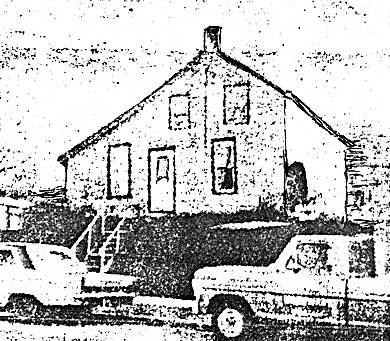
|


